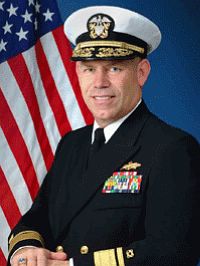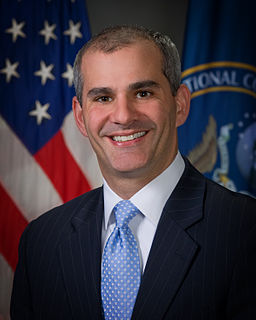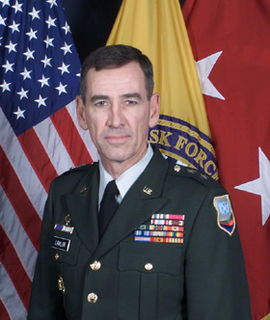Related Research Articles
The United States Armed Forces are the military forces of the United States. The armed forces consists of six service branches: the Army, Marine Corps, Navy, Air Force, Space Force, and Coast Guard. The president of the United States is the commander-in-chief of the armed forces and forms military policy with the Department of Defense (DoD) and Department of Homeland Security (DHS), both federal executive departments, acting as the principal organs by which military policy is carried out. All six armed services are among the eight uniformed services of the United States.

The United States National Security Council (NSC) is the principal forum used by the President of the United States for consideration of national security, military, and foreign policy matters. Based in the White House, it is part of the Executive Office of the President of the United States, and composed of senior national security advisors and Cabinet officials.

Thomas Joseph Ridge is an American politician and author who served as the Assistant to the President for Homeland Security from 2001 to 2003, and the first United States Secretary of Homeland Security from 2003 to 2005. Prior to this, Ridge was a member of the United States House of Representatives from 1983 to 1995 and the 43rd Governor of Pennsylvania from 1995 to 2001. He is a Republican.

William Hedgcock Webster is an American attorney and jurist who most recently served as chair of the Homeland Security Advisory Council from 2005 until 2020. He was a United States district judge of the United States District Court for the Eastern District of Missouri and a United States circuit judge of the United States Court of Appeals for the Eighth Circuit before becoming director of the Federal Bureau of Investigation (FBI) from 1978 to 1987 and director of Central Intelligence (CIA) from 1987 to 1991. He is the only person to have held both positions.

The Naval Postgraduate School (NPS) is a public graduate school operated by the United States Navy and located in Monterey, California.

Robert G. Joseph is a senior scholar at the National Institute for Public Policy and professor at Missouri State University. He was the United States Special Envoy for Nuclear Nonproliferation, with ambassadorial rank. Prior to this post, Joseph was the Under Secretary of State for Arms Control and International Security, a position he held until January 24, 2007. Joseph is known for being instrumental in creating the Proliferation Security Initiative and as the architect of the Global Initiative to Combat Nuclear Terrorism. He was also the US chief negotiator to Libya in 2003 who convinced the Libyans to give up their WMD programs. He also recently authored a book describing his experience in negotiating with Libya entitled "Countering WMD."

Dennis Cutler Blair is the former United States Director of National Intelligence and is a retired United States Navy admiral who was the commander of U.S. forces in the Pacific region. Blair was a career officer in the U.S. Navy and served in the White House during the presidencies of both President Jimmy Carter and President Ronald Reagan. Blair retired from the Navy in 2002 as an Admiral. In 2009, Blair was selected as President Barack Obama’s first Director of National Intelligence, but after a series of bureaucratic battles, he resigned on May 20, 2010.
The Georgia Tech Research Institute (GTRI) is the nonprofit applied research arm of the Georgia Institute of Technology in Atlanta, Georgia, United States. GTRI employs around 2,400 people, and is involved in approximately $600 million in research annually for more than 200 clients in industry and government.

James "Jim" M. McGarrah is the chief of staff at the Georgia Tech Research Institute. He was previously director of the Information and Communications Laboratory at the Georgia Tech Research Institute and is a retired officer of the United States Navy Reserve.

Hugo Teufel III is an American lawyer and former government official.

Michael E. Leiter was the director of the United States National Counterterrorism Center (NCTC), having served in the Bush Administration and been retained in the Obama Administration. A statement released by the White House announced his resignation, effective July 8, 2011. His successor, Matthew G. Olsen, was sworn in on August 16, 2011. In September 2017, Leiter joined international law firm Skadden, Arps, Slate, Meagher & Flom in Washington, D.C. as a partner in its national security practice.
The Project on National Security Reform (PNSR) is a nonpartisan non-profit organization mandated by the United States Congress to recommend improvements to the U.S. national security system. Advocates of reform of the U.S. national security system contend that the fundamental components of the system, which includes the National Security Council, the Department of Defense, the Department of State, the Central Intelligence Agency, among others, were largely designed via the National Security Act of 1947 in order to combat the Soviet Union. Today's global security environment, largely due to globalization, is much more complex than it was during the Cold War. PNSR argues that government structures need to be more agile and efficient in order to combat new threats such as terrorism, transnational crime, and rogue states.
Robert Edwards Hunter is an American government employee and foreign policy expert who served as United States ambassador to NATO during the Clinton administration.

The Arctic policy of the United States is the foreign policy of the United States in regard to the Arctic region. In addition, the United States' domestic policy toward Alaska is part of its Arctic policy.

Francis Xavier Taylor was the Under Secretary of Homeland Security for Intelligence and Analysis at the U.S. Department of Homeland Security (DHS), nominated by President Obama in 2014. In that role, he provided the Secretary, DHS senior leadership, the DHS components, and state, local, tribal and private sector partners with homeland security intelligence and information they need to keep the country safe, secure and resilient. DHS Office of Intelligence and Analysis is a member of, and the Department’s liaison to, the U.S. Intelligence Community.
Jeffrey Howard Norwitz is an American expert in counter-terrorism and law enforcement. Norwitz spent 38 years as a law enforcement officer, the last 25 years of which were spent with the Naval Criminal Investigative Service. From 2006 through 2009 he held the John Nicholas Brown Chair of Counterterrorism at the Naval War College. Norwitz is known for his publications on counter-terrorism, and for frequently being consulted as a "terrorism expert". Norwitz is also the author of several books on counter-terrorism.

Dr. Paul N. Stockton is the President of Paul N Stockton LLC, a strategic advisory firm in Santa Fe, NM. From 2009-2013, Dr. Stockton served as Assistant Secretary of Defense for Homeland Defense and Americas' Security Affairs, where he helped lead the Department's response to Hurricane Sandy. He was responsible for Defense Critical Infrastructure Protection, Western Hemisphere security policy, domestic crisis management, continuity of operations planning, and a range of other responsibilities. While Assistant Secretary, Dr. Stockton also served as Executive Director of the Council of Governors. After serving as Assistant Secretary, Dr. Stockton was the Managing Director of Sonecon LLC, an advisory firm in Washington, DC, from 2013-2020.

Major General (Retired) Bruce M. Lawlor is a retired United States Army officer. He is prominent as the first commander of Joint Task Force-Civil Support. In addition, he was one of five White House staff members who wrote the plan to create the Department of Homeland Security, and he was the first DHS Chief of Staff.
Todd A. Levett was an American homeland security and foreign affairs advisor, public servant, and strategist based in Washington, DC. He died of brain cancer on October 30, 2014.

Janine Anne Davidson became president of Metropolitan State University of Denver on July 24, 2017. She served in the United States Air Force and was Under Secretary of the United States Navy from 2016 to 2017. She is the author of Lifting the Fog of Peace: How Americans Learned to Fight Modern War, a study of organizational learning and institutional change within the U.S. military. She is a national thought-leader on topics such as public service, military operations and national security policy, as well as higher education leadership.
References
- ↑ Michael Chapman (2007-07-07). "Statement From Homeland Security Director Michael Chapman on the Bombing in London". Missouri. Archived from the original on September 29, 2006. Retrieved 2008-09-20.
- 1 2 3 4 "Michael F. Chapman, Director, Missouri Homeland Security" (PDF). Archived from the original (PDF) on 2011-07-26. Retrieved 2008-09-20.